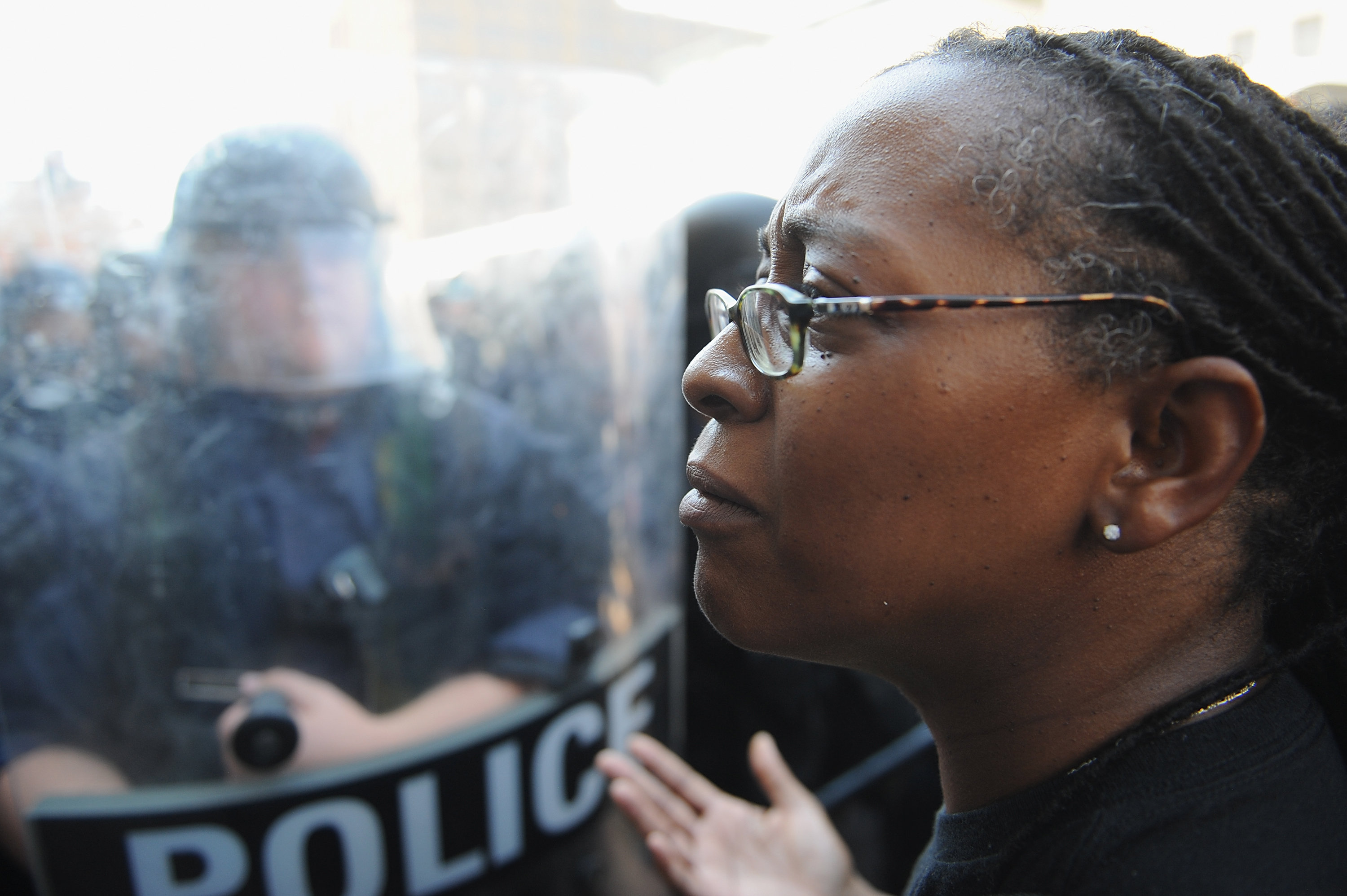Welcome to The Lede

The Lede is a new weekly newsletter giving premium members greater access to Pacific Standard stories, staff, and contributors.
For the rest of the month, The Lede will be openly available. We want to give readers a sense of one part of the exclusive content they will receive as a PS Premium member—in addition to eight print issues, early access to feature stories, data privacy, and ad-free access to our site. All for just $3.99 a month.
Most importantly, memberships help support stories that make a difference.
The Edit
Our podcast episode featuring Alli Maloney, writer of the recent story “Henry Green, The Columbus Police, and the Jump Out Boys: How Racism Becomes Institutionalized in Police Departments,” is available to listen to here.
You can also subscribe to the podcast on Apple iTunes and SoundCloud.

The Lasting Impact of Racial Trauma
America’s racial past is an ugly one. It’s riddled with death, enslavement, and even war. Over time people have attempted to bury or obfuscate this past, but, in recent years, after Trayvon Martin, Ferguson, and Donald Trump’s election, our country is being forced to confront ongoing issues with racism.
Bryan Stevenson is a particularly impassioned and persuasive voice on this topic. He is a Harvard University-trained public defense attorney who is the director of the Equal Justice Initiative. Pacific Standard contributing writer James McWilliams spoke with Stevenson about the ongoing societal damage created through this traumatic history in the modern day. He discussed how confronting these continued problems is the only way to achieve any sort of solution: “You can’t do reconciliation work, you can’t do restoration work, you can’t do racial justice work, you can’t create the outcome that you desire to see until there has been truth-telling.”
Inclusive and thorough coverage of racial issues is an essential part of that truth telling. Racial trauma in America manifests itself in many different ways, and it’s ramifications can be wide reaching. Whether it shows itself in citizens losing faith in their civic institutions in places like Columbus, Ohio, or in how African-American men cope with violent injury. Childhood trauma, which children of color, can have effects that follow people into adulthood.
In an interview with editorial intern Chinelo Nkechi Ikem, writer Ijeoma Oluo brought up another aspect of racial trauma: how people of color are not only forced to reckon with these issues, but then also act as the main driver of conversations about race in America: “For people of color, not only are you bringing up trauma and things that have happened to you, and talking about real pains and experience, but you are also risking that pain being used against you and that pain causing even more pain.” It is in this way that society expects people of color to take agency in changing the forces that have inflicted trauma upon them.
At Pacific Standard, we have a responsibility to take on part of this burden and push the conversation on race in America into a more productive and progressive place. By covering these stories and issues we are trying to help partake in that movement toward a more inclusive society.
The Death Penalty in America
This brief history of the death penalty in the U.S. was written by editorial assistant Morgan Baskin. It ran in print alongside our feature story about Terri Been’s fight to save her brother from being executed for a murder he did not commit. Here is an excerpt:
1794: Pennsylvania’s legislature scraps the death penalty for all crimes, with the exception of murder “in the first degree.” It was the first time a state governing body made a legal distinction between premeditated and accidental murder.
1846: Michigan becomes the first state to abolish the death penalty (except in cases of treason). Six years later, Rhode Island follows. A botched hanging in Wisconsin, which results in the convict twitching for five minutes at the end of his rope, prompts that state to abolish capital punishment in 1853.
1888: New York dismantles its gallows and builds the country’s first electric chair, reportedly prompted by a feud between competing electricity suppliers, the Edison and Westinghouse companies, over the safest way to transmit electricity. In an attempt to prove Westinghouse’s method of supplying electricity could harm consumers, Edison employees publicly electrocuted dogs, cats and—in a particularly gruesome display—an elephant. Other states soon adopted the electric chair, determining it to be more humane than hanging.
To read the rest of Baskin’s rundown about America’s lethal history of capital punishment click here.

Since We Last Spoke: Injustice for Life
Updates to stories from the Pacific Standard archive.
In October of 2017, Governor Jerry Brown signed a law banning mandatory life sentences without the possibility of parole (LWOP) for juveniles. The bill made California the 20th state to ban these sentences for juvenile offenders, and brought the Golden State in line with a 2012 Supreme Court decision that such sentences constitute cruel and unusual punishment.
In addition, as Kate Wheeling reported last year for PSmag.com, LWOP sentences are disproportionately administered: “Surveying over 1,500 juvenile lifers across the nation between October 2010 and August 2011, the [Sentencing] Project found that 97 percent of them were men and a full 60 percent were black.”
The California bill ensures that anyone who was given a life sentence as a minor will become eligible for a youth parole hearing after 25 years behind bars. This will reportedly make about 300 inmates eligible for parole hearings.
PS Picks
PS Picks is a selection of the best things that the magazine’s staff and contributors are reading, watching, or otherwise paying attention to in the worlds of art, politics, and culture.
Donald Glover: Donald Glover exists in any cultural sphere that he wants to. He is the emotive funk singer and the peacocking lyricist. He is the broke, Princeton University dropout hustling his way into the Atlanta music scene and the swaggering interstellar smuggler. Basically, Glover can travel: from your headphones to your screens to the pages of a fashionable magazine. Example of the last instance, earlier this month Bijan Stephen penned a rangy profile of the polymathic creator for Esquire. Throughout the piece Stephen digs down to uncover the personality that underlies the abiding charisma within all of Glover’s iterations: Earn, Gambino, Calrissian, whomever. I’m not sure the profile quite gets there, but it does contain a quote that touches on an essential aspect of Glover’s cultural power: “Black people do not have the narrative over their story. It’s always been written by somebody else.” As a writer, performer, and all-around talent, Glover embodies the artistic power of putting those narratives back in the hands of the people who’ve lived them, and perhaps that’s why he thrives anywhere he wants to be.
—Ian Hurley, Engagement Fellow
Marilynne Robinson: One of the startling things about a Marilynne Robinson essay is that it feels at once old-fashioned and also as though it might have been written yesterday. This is a deceptive approach that leads to startling effects. In her latest collection, What Are We Doing Here?, Robinson sounds Emersonian notes, but also draws on the styles of Montaigne and Augustine and, of course, the early American preachers—often in the same essay, and often while discussing recent phenomena in the context of the eternal. As a result, when you open the book you’re struck by the pleasing sense of reading an old master who’s been given the Lazarus treatment to come back and explain Fox News via the Epistle of James.
If there’s one concern that unites these essays, it is the question of how to conquer cynicism in a secular world. (“So great is my respect for secular people that I wish they had a metaphysics worthy of them.”) Robinson argues passionately that the humanities can save us—if we can save the humanities. (“We have not lost them. We have only forgotten what they mean.”) She wants right-wing social Darwinists and left-wing economists alike to develop a grander vision, one where they understand that human beings are motivated by more than their own profit. (“There are those who would account for all this brilliance and urgency as the effect of tiny increments of applied self-interest.”) I’m not sure she’s right about cynicism among Marxists—the Marxists in my acquaintance are some of the least cynical people I know—but regardless the topic, it remains a treat to watch Robinson’s mind at work on the page.
—Ted Scheinman, Senior Editor
Worst Roommate Ever: I live alone and have always thought my joke that, as such, I have the worst roommate possible was truthful: I procrastinate on dishes, leave clothes laying around, forget to take out the trash—the whole gauntlet of lazy bad roommate traits. But then I read William Brennan’s “Worst Roommate Ever.” The New York magazine feature paints a portrait of a serial squatter, Jamison Bachman, who used his legal training to bully and intimidate dozens of housemates out of their homes, seemingly for nothing more than the sadistic thrill of doing so. Brennan details an escalation of abuse from Bachman dumping cat litter in the toilet; to bullying his way out of four years of rent by claiming every minor discomfort inflicted upon him, like unwashed dishes, voided the lease; to filing protection orders to prevent his roommate from entering the home, etc.—all the way up to physical violence. (An aside about a young Bachman witnessing the murder of his friend over a cheese sandwich—yes, a cheese sandwich—is about the 20th most bizarre, and terrifying detail in this story.) I can’t do it justice.
—Ben Rowen, Associate Editor
PS in the News
A look at where our stories and staff surface in the national conversation.
- Contributing writer David M. Perry‘s story about harassment allegations against YA author Daniel Handler—the author of A Series of Unfortunate Events under the pen name Lemony Snicket—was the impetus for this Dee Lockett story for Vulture.
- Perry also made an appearance on Ohio public radio to discuss Congress’ recent move to roll back key provisions of the Americans With Disabilities Act.
- Tom Jacobs’ recent piece about Trump supporters’ affinity for a particularly troubling strain of authoritarianism was included in Washington Post Happy Hour Roundup.
- A recent story in Science referenced staff writer Francie Diep’s article about research into the sugar industry’s potential meddling in scientific research about the health impacts of that sweet fructose.
The Conversation
Why Do Christian Schools Get a Pass in Conversation About Academic Freedom? (PSmag.com, November 3th)
- College of the Ozarks doesn’t charge tuition. This is great for low-income students. Yes, they have a goofy course, but at least they’re putting students in needless debt. —Mark Gould
- I was at a conservative college and was forced out for supporting gay rights. I don’t support speech codes specifically because of that experience. I don’t think Millennials are snowflakes, but I’ve seen what role mandatory censorship and enforced indoctrination had on the development of young minds. I didn’t like it when the right did it then (or now). And I have no reason to like it when the left does it now either. —John Weaver
If you have any thoughts about this newsletter or our work—what you like/didn’t like/want to see more of—you can reach us at premium@psmag.com. Become a premium member by following the button below. As we continue to build out the benefits of a premium membership to Pacific Standard, we want to hear what would be most valuable to you.





